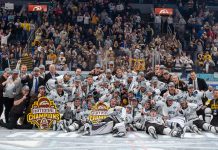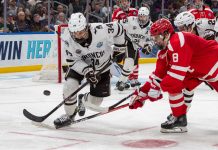TAMPA, Fla. — In a meeting on Thursday before the broadcast of the national semifinal games, NCAA officials and ESPN production staffers met to improve communication about replays and agreed on a method to let the broadcast crew know what was being reviewed.
“We’ve actually taken some steps here at the Frozen Four to make sure that the ESPN timeout coordinator, who’s at ice level, gets kind of a quick, ‘Hey, they’re looking at whether the net was dislodged,’ or what have you,” Ty Halpin, NCAA associate director for playing rules administration, said during Thursday’s USCHO Live! broadcast.
Halpin was joined on the program by members of the ice hockey rules committee: Steve Piotrowski, the secretary and rules editor for the NCAA men’s and women’s ice hockey rules committee; Frank Cole, NCAA national coordinator of men’s ice hockey officiating; and Ed McLaughlin, Niagara athletic director and chairman of the rules committee.
Joe Taylor, producer for ESPN’s Frozen Four broadcasts, explained what was decided.
“The way it will work is that I can talk directly to the replay official, but what will probably happen is that I will talk with the timeout coordinator, who will know what the officials are looking for,” said Taylor. “If there’s any doubt at what the officials are looking for, I can let the announcers know.”
“That way we’re all on the same page and the talent can let the audience know exactly what the officials are looking for,” Taylor added.
“ESPN has been good at telling their announcers not to guess, because that changes things for fans listening at home saying, ‘Why would they be looking at that?’ They need the right information,” said Halpin.
NCAA replay officials are continuously rewinding and reviewing plays during the game. “The NCAA has set up almost a TV truck of our own,” Halpin said. “So we’re completely separate from ESPN. We have nearly the same amount of equipment as they have on our own.”
During the NCAA regionals, announcers at times speculated on what referees were looking at on video replay. Piotrowski said that broadcasters need to understand what is and is not reviewable.
“The criteria that’s established to allow video replay is in our rule book. It’s just a matter of opening up the book and doing your homework,” said Piotrowski, who did note that ESPN producers are committed to educating their announcers. “If you’re going to make a comment, whether it’s in print or on television, make sure you have rule knowledge, particularly on what you’re broadcasting.”
Section 60 of the NCAA ice hockey rule book lists 11 replay review situations:
a. A puck crossing the goal line;
b. A puck in the net before the goal frame is dislodged;
c. A puck in the net before or after expiration of time at the end of a period, a whistle, or referee’s determination that play has stopped;
d. A puck directed into the net by a hand or a distinct kicking motion;
e. A puck deflected into the net by an official;
f. A puck hit into the net by a high stick;
g. To correctly identify individuals who participated in a fight or committed an infraction;
h. To establish the correct time on the clock, or to determine the correct location of a faceoff;
i. To determine if an attacking player was illegally in the goal crease and physically or visually prevented the goalkeeper from defending the goal when the puck entered the goal cage;
j. To determine if a goal was scored as the direct result of a hand pass or high stick by an attacking player to a teammate, initiated or completed within the goalkeeper’s privileged area; or
k. To determine if a goal was scored, as a direct result of the puck deflecting off of the protective netting above the glass, by the first team to gain possession of the deflected puck.
ESPN’s Barry Melrose may find himself commenting on replay in Saturday’s championship game. Melrose would like to see the replay process sped up. “It’s tough when you’ve had a tying goal and it’s an unbelievable play and you’ve got to wait 10 minutes to find out if it’s a goal or not,” he said.
But the NCAA is not likely to support a rule change that would impose a time limit. Cole said, “Our objective is to take as much time as necessary to make the call correct.”
Replay and other rule changes will be looked at during this offseason.
A free copy of the NCAA ice hockey rulebook may be downloaded at https://www.uscho.com/wp-content/uploads/2012/04/IH12.pdf


